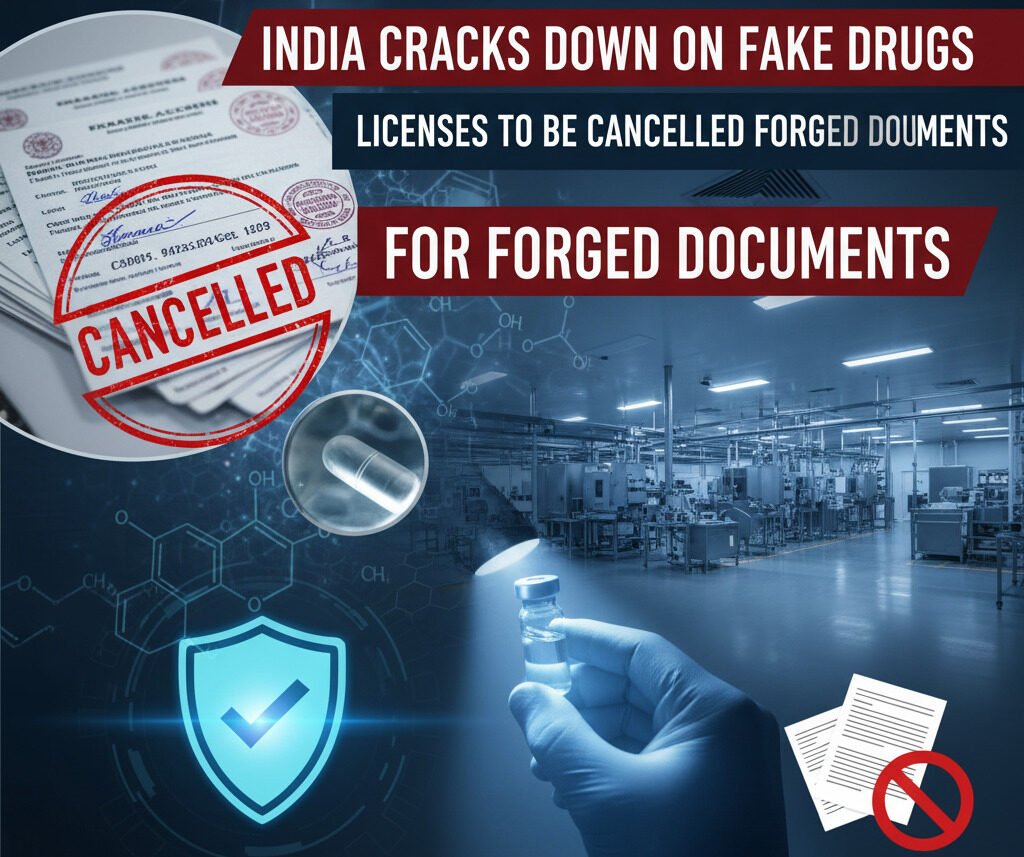New Delhi – In a decisive step to combat fake and substandard drugs, the Government of India has amended the Drugs and Cosmetics Rules, 1945, empowering regulators to cancel or suspend licences of pharmaceutical companies that submit forged documents or false information in their applications for manufacturing, sale, or registration.
The move follows a series of scandals that have shaken confidence in India’s pharmaceutical industry — one of the largest drug suppliers to global markets — and marks a renewed push by the Centre to restore transparency, accountability, and public trust in the sector.
Why the Crackdown Was Needed
A senior official from the Central Drugs Standard Control Organisation (CDSCO) told The Economic Times that several companies in recent years were found using falsified documents to obtain or renew their licences.
“These fabrications have led to quality lapses and, in some cases, endangered public health,” the official said, adding that one such case involved Tamil Nadu-based Shri Sun Pharma, which allegedly renewed its licence using misleading records before the Madhya Pradesh cough syrup tragedy that caused the death of several children.
The official added that these incidents have exposed critical weaknesses in the verification framework, prompting the Centre to tighten licensing norms.
The Amendment: What Changes Now
Under the newly issued notification, regulators have been granted stronger powers to act swiftly against offenders.
Key provisions include:
- Licence Cancellation and Suspension: Any company found furnishing fake or misleading information can have its licence revoked or suspended without delay.
- Mandatory Verification: Every application for a new or renewed licence will undergo document authentication and field verification.
- Right to Appeal: Companies can file an appeal within 30 days if they dispute a licensing authority’s order. The appeal will be heard by the respective state or central government, which will issue a final decision after due inquiry.
- Temporary Ban: Firms found guilty may be barred from manufacturing or selling drugs for a period determined by the regulatory authority.
Timeline and Implementation
The CDSCO first released a draft amendment on October 16, inviting public comments and feedback from industry stakeholders. Following consultations, the final notification was published on October 28, officially bringing the new provisions into force.
According to the CDSCO, the amendment is aimed at “curbing falsification of documents and manipulation of licensing data within the pharmaceutical ecosystem.”
Impact Across the Pharma Industry
The tougher framework is expected to have a far-reaching impact on India’s pharmaceutical landscape — particularly for small and mid-tier manufacturers.
Industry experts predict that while licensing procedures may become lengthier and more stringent, the new regime will weed out non-compliant operators and help reinforce India’s reputation as a credible global supplier of quality medicines.
Compliance officers say the rule change will force companies to streamline internal documentation processes and maintain stronger traceability records throughout the supply chain.
“This is not just a legal reform — it’s a moral and public health imperative,”
said a senior CDSCO official.
“The intent is to rebuild public confidence in Indian pharmaceuticals through integrity and transparency.”
Global Context
India’s pharmaceutical exports — valued at over $25 billion annually — have come under scrutiny following reports of contaminated cough syrups and falsified quality certificates in Africa and Southeast Asia.
The Centre’s latest intervention is expected to reassure global regulators, including the World Health Organization (WHO), of India’s commitment to enforcing quality assurance and ethical manufacturing standards.
The Road Ahead
While major industry associations have welcomed the amendment, they have also urged the government to modernize approval processes to prevent delays in legitimate applications.
Analysts expect the Central Drugs Standard Control Organisation to introduce digital verification systems and AI-driven data audits in the next phase of implementation to track compliance in real time.
At a Glance: Key Provisions
Provision Description
- Licence Revocation Immediate cancellation if false documents are detected
- Mandatory Verification Compulsory document and site verification for every licence
- Appeal Process 30-day window to appeal before State or Central authorities
- Temporary Ban Offenders can be barred from operations pending inquiry
- Scope Applies to manufacturers, distributors, sellers, and research units
Bottom Line
The amendment signals the government’s intent to clean up the pharmaceutical licensing ecosystem — ensuring that public safety, not paperwork manipulation, determines who can manufacture and sell medicines in India.


